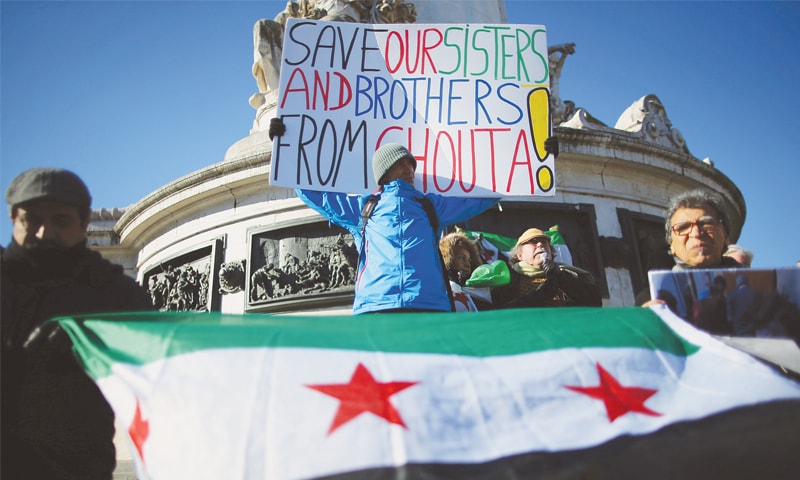NEW YORK: The UN Security Council unanimously approved a resolution on Saturday demanding a 30-day ceasefire across Syria “without delay” to deliver humanitarian aid to millions and evacuate the critically ill and wounded.
UN humanitarian chief Mark Lowcock welcomed the vote saying: “Words must now quickly become action — any cessation of hostilities must be real.
Attacks must stop.” The vote was postponed for several days of lengthy and intense negotiations to try to get support from Russia, a key Syrian ally that said repeatedly an immediate ceasefire was unrealistic.
Vote was postponed several times due to lengthy and intense negotiations to try to get support from Russia, a key Syrian ally
Sponsors of the resolution, Kuwait and Sweden, amended it on Friday in a last-minute attempt to satisfy Russia, dropping a demand that the ceasefire take effect in 72 hours. The effort worked, though US Ambassador Nikki Haley was sharply critical of Russia for delaying the vote.
Sweden, Kuwait and many other countries had been pressing for an immediate ceasefire as deaths mount in a Syrian bombing campaign in the rebel-held suburbs of Damascus known as eastern Ghouta where the death toll in a week of bombardment has risen to 500.
Earlier this week UN Secretary-General Antonio Guterres urged an immediate suspension of “all war activities” in eastern Ghouta, where he said 400,000 people were living “in hell on earth”.
Mr Guterres welcomed the resolution’s adoption and stressed his expectation that it will be “immediately implemented and sustained” so aid gets to the needy and sick.
While the spotlight is on eastern Ghouta, the resolution expressed “grave distress” at the humanitarian situation there as well as throughout the country.
The resolution called on all parties to immediately lift the sieges of populated areas including eastern Ghouta, Yarmouk, Foua and Kefraya.
On the key issue of a ceasefire, the resolution “demands that all parties cease hostilities without delay for at least 30 consecutive days throughout Syria for a durable humanitarian pause”.
The resolution also demands that a ceasefire be followed immediately by access for humanitarian aid.
Humanitarian suffering
Kuwait’s UN Ambassador Mansour Al-Otaiba, the current council president, said after the resolution’s adoption that “it cannot end the human suffering in Syria immediately”.
“However, it is a positive sign sent by the Security Council...a sign that the council is united and showed solidarity to stop the humanitarian suffering and stop hostilities immediately,” he added.
Since the Syrian conflict began nearly seven years ago, the Security Council has been deeply divided, with Russia backing President Bashar Assad’s government and the US, Britain and France supporting the opposition. The result has almost always been paralysis and inaction.
Those divisions were evident on Saturday in the tough language from the US ambassador and the reply from her Russian counterpart after the vote.
“Every minute the council waited on Russia the human suffering grew,” Ms Haley said. “Getting to a vote became a moral responsibility for everyone, but not for Russia, not for Syria, not for Iran. I have to ask why,” she added.
Russia’s UN Ambassador Vassily Nebenzia responded saying it took so much time to reach an agreement because an immediate cessation of hostilities, which was originally called for by the sponsors, was “not feasible... not possible”.
“It would be naive to think that difficult issues can be addressed overnight, momentarily. We trust that all parties with influence to bear will help to bring this about,” he said.
Published in Dawn, February 26th, 2018















































Dear visitor, the comments section is undergoing an overhaul and will return soon.